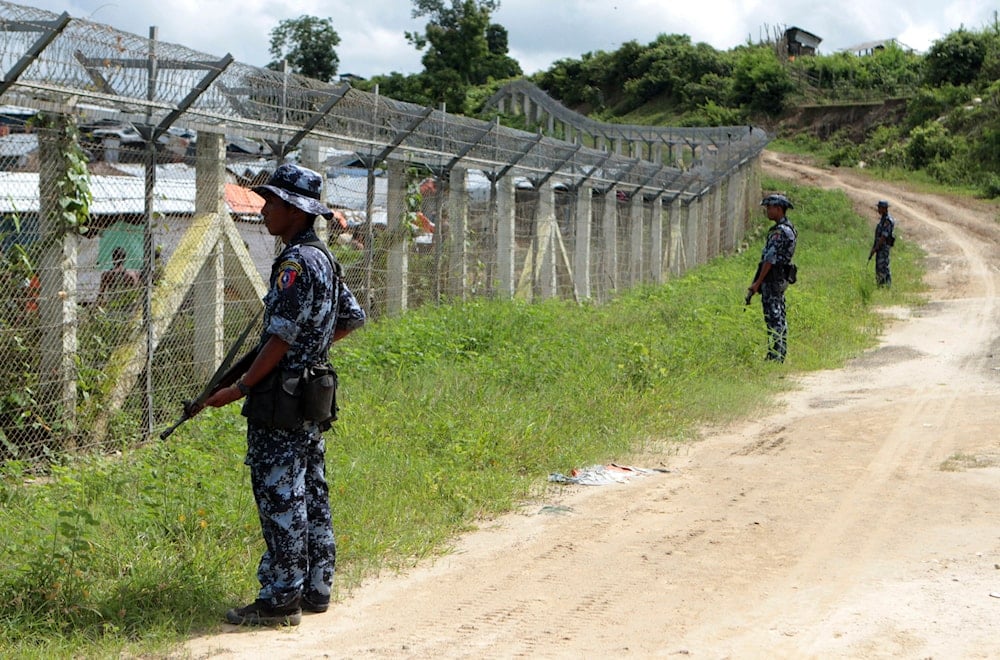Thousands freed from Myanmar scam compounds in crackdown
Myanmar, Cambodia, and Laos have become hotspots for criminal syndicates running online scam operations, luring thousands into forced labor.
-

Myanmar border guards stand to provide security near the fence at a no-man's land between Myanmar and Bangladesh, near Taungpyolatyar village, Maungdaw, northern Rakhine State, Myanmar, on June 29, 2018. (AP)
About 7,000 people have been rescued from illegal call center operations in Myanmar and are awaiting transfer to Thailand, Prime Minister Paetongtarn Shinawatra announced on Wednesday, as the country intensified its crackdown on scam compounds along the border.
The announcement followed reports from Thai police that they were preparing to receive as many as 10,000 foreigners freed from a network of notorious scam centers.
Myanmar, Cambodia, and Laos, which share borders with Thailand, have become hubs for transnational crime syndicates operating online scams — including romance fraud, fake investments, and illegal gambling.
"It’s massive and there are thousands of people in there that have been brought in, typically through Thailand, so it’s a huge move if they clean the compounds and scams out," said Jeremy Douglas from the United Nations Office on Drugs and Crime (UNODC), ahead of the prime minister’s confirmation.
Myawaddy, a border area in Myanmar where foreign nationals are expected to be released, is home to one of the largest clusters of scam compounds in the region — and possibly the world, according to Douglas.
Tens of thousands held in such compounds
The operations have become increasingly global, with victims from Asia, Africa, and the Middle East coerced into forced labor. Scams targeting East and Southeast Asians have led to financial losses estimated between $18 billion and $37 billion in 2023, the UN reported.
The UN also estimates that at least 120,000 people across Myanmar and another 100,000 in Cambodia may be held in conditions where they are forced to carry out lucrative online scams, with many lured by deceptive offers of high-paying jobs.
Thailand has ramped up its efforts this year to dismantle the networks, particularly after the high-profile kidnapping of Chinese actor Wang Xing in January. The 22-year-old was abducted after arriving in Thailand, believing he was attending a casting call with film producers.
This month, Thai authorities cut internet, electricity, and fuel supplies to five areas in Myanmar where crime syndicates are known to operate.
Douglas noted that Myanmar’s Border Guard Force (BGF), which controls Myawaddy, had faced intense pressure to take action.
"It has reached a breakpoint recently where they [the BGF] felt they had no choice but to step in and shut down compounds," he said.
Around 200 Chinese nationals are expected to be flown back to China on a China Southern Airlines flight on Thursday, according to General Traisak Intarassamee, secretary to the Thai defense minister, as reported by the Bangkok Post.
Last week, 260 people from scam operations were deported from Myanmar, according to a statement from the Thai Army. The group included individuals of 20 nationalities, among them 138 Ethiopians.
Rescued Malaysians described brutal abuse, including electrocution, caning, and confinement in dark rooms when they failed to meet the scam company’s targets.
"There were extreme beatings, lots of bruising. There were broken bones," said Judah Tana, international director of the anti-human trafficking NGO Global Advance Projects. "It’s horrific to see them. It’s as if they have walked out of a minefield or a war zone."
Read more: UK’s strict immigration rules may trap modern slavery victims

 3 Min Read
3 Min Read










